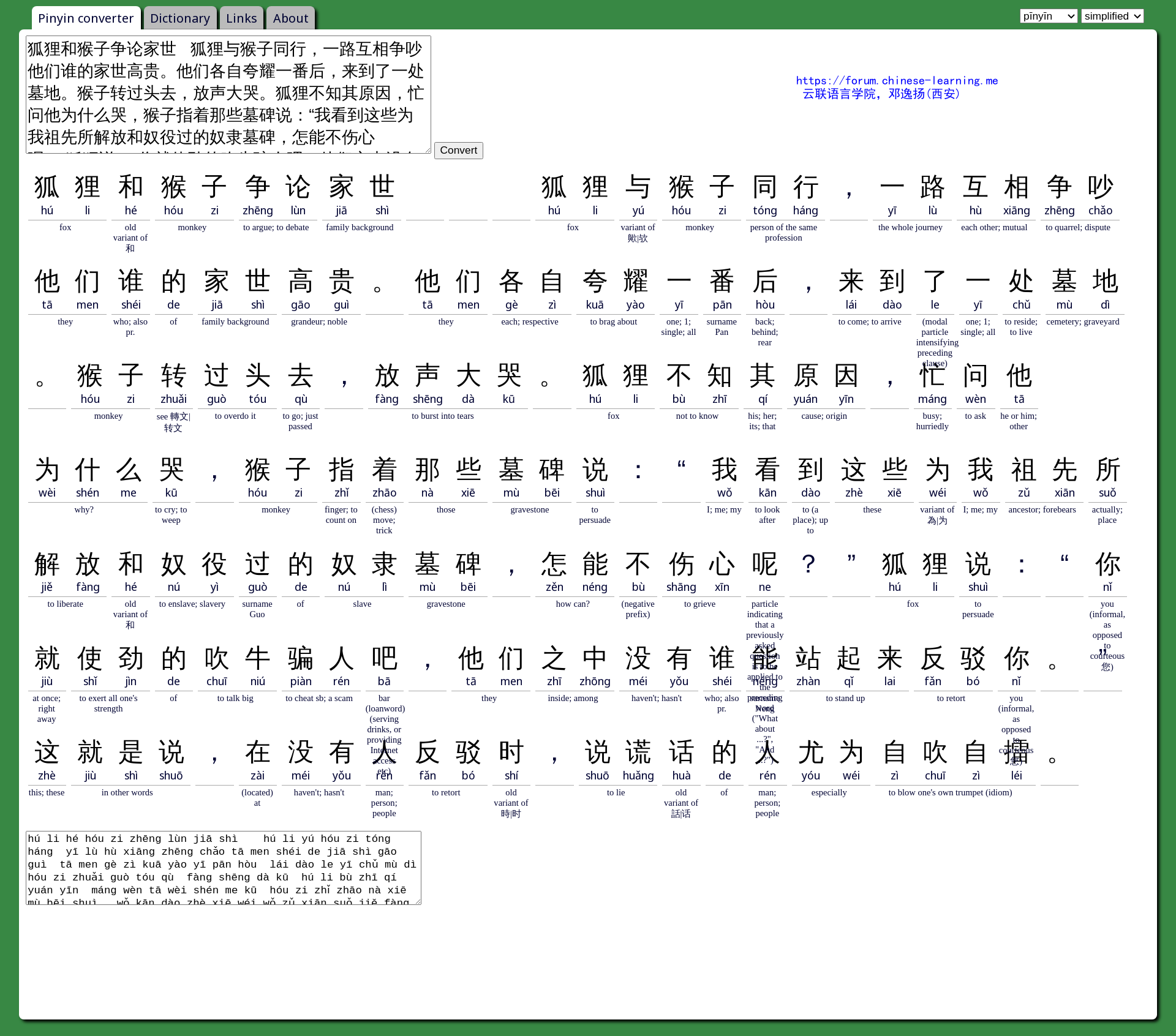
Show Pīnyīn
狐狸与猴子同行,一路互相争吵他们谁的家世高贵。他们各自夸耀一番后,来到了一处墓地。猴子转过头去,放声大哭。狐狸不知其原因,忙问他为什么哭,猴子指着那些墓碑说:“我看到这些为我祖先所解放和奴役过的奴隶墓碑,怎能不伤心呢?”狐狸说:“你就使劲的吹牛骗人吧,他们之中没有谁能站起来反驳你。”
这就是说,在没有人反驳时,说谎话的人尤为自吹自擂。
húli yǔ hóuzi tóngxíng , yīlù hùxiāng zhēngchǎo tāmen shéi de jiāshì gāoguì 。 tāmen gèzì kuāyào yīfān hòu , láidào le yīchù mùdì 。 hóuzi zhuǎnguò tóuqù , fàngshēngdàkū 。 húli bùzhī qí yuányīn , máng wèn tā wèishénme kū , hóuzi zhǐzhe nàxiē mùbēi shuō : “ wǒ kàndào zhèxiē wéi wǒ zǔxiān suǒ jiěfàng hé núyì guò de núlì mùbēi , zěnnéngbù shāngxīn ne ? ” húli shuō : “ nǐ jiù shǐjìn de chuīniú piànrén bā , tāmen zhīzhōng méiyǒu shéi néng zhàn qǐlai fǎnbó nǐ 。 ”
zhèjiùshìshuō , zài méiyǒu rén fǎnbó shí , shuō huǎnghuà de rén yóuwéi zìchuīzìléi 。

The fox and the monkey walked together, arguing with each other which one of them had a noble family background. After boasting about each other, they came to a cemetery. The monkey turned his head away and burst into tears. The fox didn't know the reason, so he asked him why he was crying. The monkey pointed to the tombstones and said, "How can I not be sad when I see these tombstones of slaves who were liberated and enslaved by my ancestors?" Brag and lie, none of them can stand up and refute you."
That is to say, the liar is especially boastful when there is no one to contradict him.
El zorro y el mono caminaban juntos, discutiendo entre sí cuál de ellos tenía antecedentes familiares nobles. Después de jactarse el uno del otro, llegaron a un cementerio. El mono volvió la cabeza y se echó a llorar. El zorro no sabía la razón, así que le preguntó por qué lloraba, el mono señaló las lápidas y dijo: "¿Cómo no voy a estar triste cuando veo estas lápidas de esclavos que fueron liberados y esclavizados por mis antepasados? "Presume y miente, ninguno de ellos puede ponerse de pie y refutarte".
Es decir, el mentiroso es especialmente jactancioso cuando no hay quien le contradiga.
Le renard et le singe marchaient ensemble, se disputant pour savoir lequel d'entre eux avait une famille noble. Après s'être vantés l'un de l'autre, ils sont arrivés dans un cimetière. Le singe détourna la tête et fondit en larmes. Le renard ne connaissait pas la raison, alors il lui a demandé pourquoi il pleurait. Le singe a pointé les pierres tombales et a dit : "Comment puis-je ne pas être triste quand je vois ces pierres tombales d'esclaves qui ont été libérés et réduits en esclavage par mes ancêtres ? « Se vanter et mentir, aucun d'eux ne peut se lever et vous réfuter.
C'est-à-dire que le menteur est particulièrement vantard lorsqu'il n'y a personne pour le contredire.
キツネとサルは、どちらが高貴な家系であるかを言い争いながら、一緒に歩きました。互いに自慢した後、彼らは墓地に来ました。猿は頭をそむけて泣き出しました。理由がわからないキツネがなぜ泣いているのかと尋ねると、サルは墓石を指差して、「先祖に解放され、奴隷にされた奴隷たちの墓石を見て、悲しくならないわけがない。 「自慢して嘘をつく、誰も立ち上がってあなたに反論することはできません。」
つまり、嘘をつく人は、反論できる人がいないときは特に自慢します。
Der Fuchs und der Affe gingen zusammen und stritten miteinander, wer von ihnen aus einer adeligen Familie stammte. Nachdem sie miteinander geprahlt hatten, kamen sie zu einem Friedhof. Der Affe wandte den Kopf ab und brach in Tränen aus. Der Fuchs wusste den Grund nicht, also fragte er ihn, warum er weine. Der Affe zeigte auf die Grabsteine und sagte: „Wie kann ich nicht traurig sein, wenn ich diese Grabsteine von Sklaven sehe, die von meinen Vorfahren befreit und versklavt wurden? " Prahlen und lügen, keiner von ihnen kann aufstehen und dich widerlegen."
Das heißt, der Lügner ist besonders prahlerisch, wenn es niemanden gibt, der ihm widerspricht.